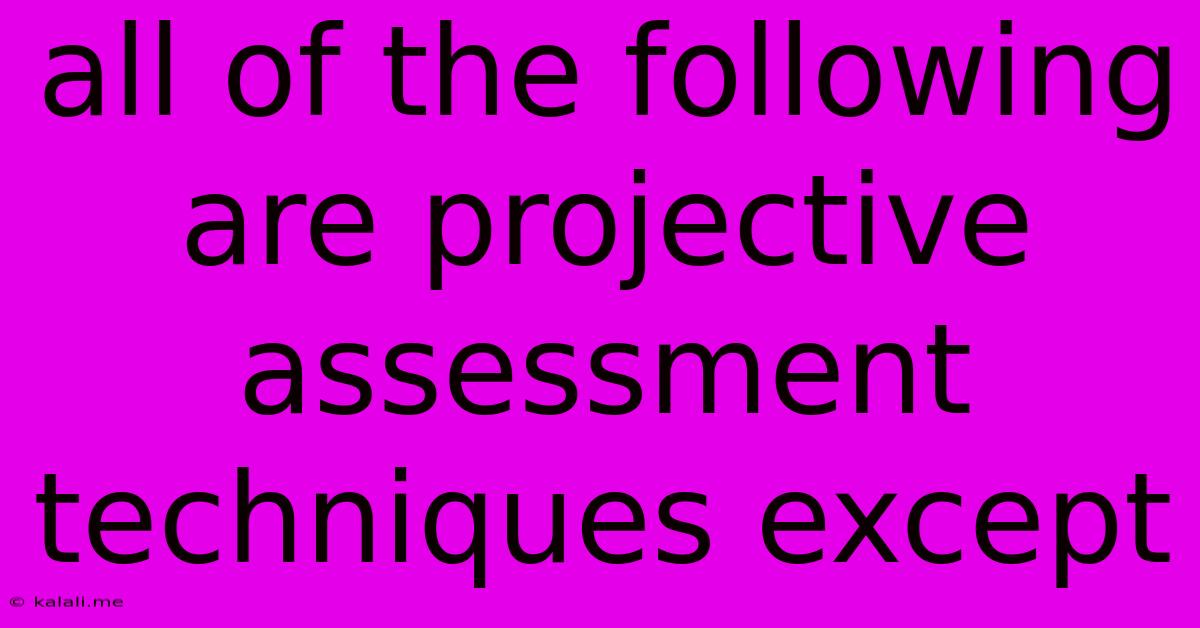All Of The Following Are Projective Assessment Techniques Except
Kalali
Jun 14, 2025 · 3 min read

Table of Contents
All of the Following Are Projective Assessment Techniques Except: Understanding Projective Tests and Their Alternatives
Projective assessment techniques are a fascinating area of psychology, offering a window into the unconscious mind. These methods present ambiguous stimuli – like inkblots or incomplete sentences – and ask individuals to interpret them. The underlying assumption is that the individual's responses will reveal underlying thoughts, feelings, and motivations. But not all assessment techniques fall under this umbrella. This article will delve into projective techniques, highlighting what defines them and providing examples of what is not considered a projective assessment.
What are Projective Assessment Techniques?
Projective tests are indirect methods of personality assessment. They rely on the principle that individuals project their inner world onto the ambiguous stimuli provided. The responses are then analyzed by trained professionals to interpret patterns and underlying psychological processes. The aim isn't to get a direct, explicit answer, but to uncover implicit meanings and unconscious dynamics. This makes them valuable tools in exploring complex psychological issues. Common examples include:
- Rorschach Inkblot Test: This well-known test presents a series of inkblots, and individuals describe what they see.
- Thematic Apperception Test (TAT): Participants are shown ambiguous pictures and asked to create a story around them.
- Sentence Completion Tests: These involve completing incomplete sentences, revealing attitudes and beliefs.
- Draw-a-Person Test: Individuals draw a person, and the details of the drawing are analyzed for potential indicators of psychological states.
What isn't a Projective Assessment Technique?
Understanding what doesn't constitute a projective assessment is equally important. Projective tests are distinguished by their reliance on ambiguous stimuli and the interpretation of unconscious projections. Techniques that rely on direct questioning, structured responses, or objective scoring fall outside this category. Examples include:
-
Objective Personality Tests: These tests, like the Minnesota Multiphasic Personality Inventory (MMPI-2-RF) or the NEO PI-R, use standardized questionnaires with clearly defined questions and scoring systems. There's little room for subjective interpretation. The responses are directly related to the measured traits.
-
Structured Interviews: These interviews use a predetermined set of questions, minimizing ambiguity and allowing for more objective assessment. While some clinical interviews may incorporate open-ended questions, the overall structure distinguishes them from projective methods.
-
Behavioral Assessments: These techniques focus on observable behaviors rather than interpretations of ambiguous stimuli. Examples include behavioral checklists, direct observation, and functional behavioral assessments.
-
Cognitive Tests: These assessments focus on specific cognitive abilities like memory, attention, and problem-solving. They are standardized and objectively scored. The Wechsler Adult Intelligence Scale (WAIS) and the Stanford-Binet Intelligence Scales are examples of these.
-
Neuropsychological Assessments: These assess brain function and cognitive abilities. They often involve specific tasks and objective measurements rather than ambiguous interpretations.
In Conclusion:
Projective assessment techniques offer valuable insights into the unconscious mind, but they require skilled interpretation and are not without limitations. Understanding the differences between projective tests and other assessment methods is crucial for proper application and interpretation of psychological data. While projective tests offer a unique approach, objective and structured assessment methods are also essential tools in a comprehensive psychological evaluation. The choice of assessment technique depends on the specific clinical question and the goals of the assessment.
Latest Posts
Latest Posts
-
Dc To Ac Power Inverter Circuit
Jun 15, 2025
-
What Is The Square Of 65
Jun 15, 2025
-
Lines Of Symmetry In A Parallelogram
Jun 15, 2025
-
Which Of The Following Is Not Part Of Effective Communication
Jun 15, 2025
-
Which Of The Following Statements Is True About Ions
Jun 15, 2025
Related Post
Thank you for visiting our website which covers about All Of The Following Are Projective Assessment Techniques Except . We hope the information provided has been useful to you. Feel free to contact us if you have any questions or need further assistance. See you next time and don't miss to bookmark.